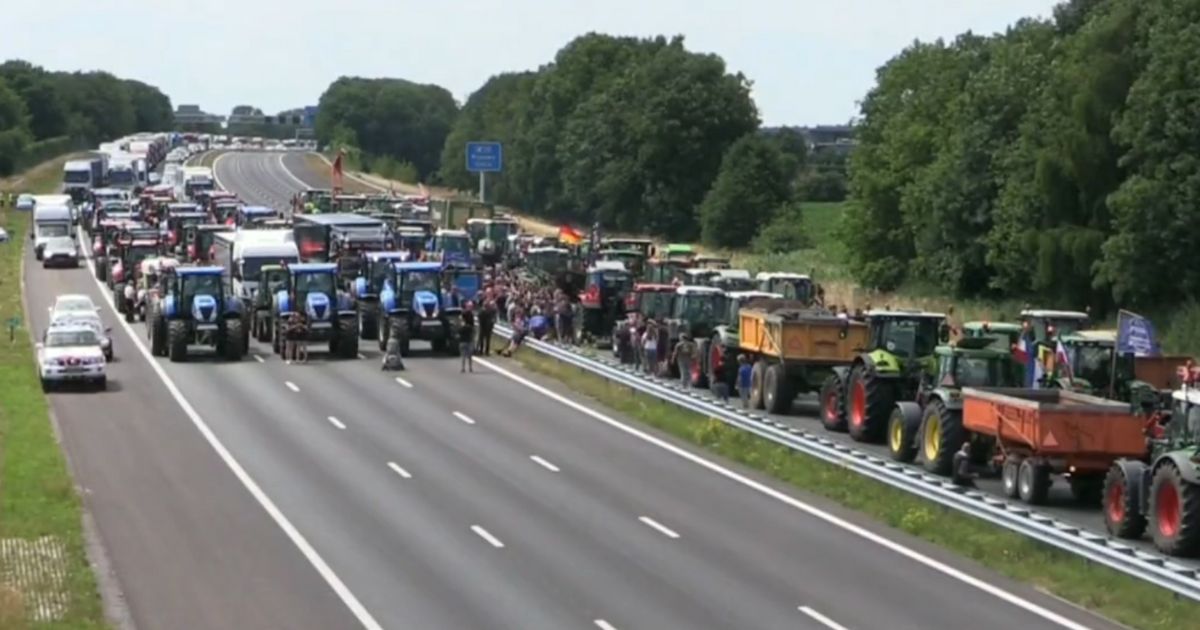Farmers in the Netherlands conducted several demonstrations this week against the country’s radical plans to slash nitrogen and ammonia emissions.
On Monday, farmers in their tractors blocked highways in multiple parts of the country and set fires near the town halls of Apeldoorn and Epe in Central Netherlands, The Associated Press reported.
Near Liessel — 93 miles from Amsterdam, the nation’s capital — a truck dumped large plastic-wrapped bales of hay on a stretch of highway.
Dutch authorities warned motorists of roadblocks as tens of thousands of farmers from all over the country congregated in Central Netherlands to protest the emission policies, according to The AP.
On Tuesday, farmers brought cows to the Dutch House of Representatives building at The Hague, Bloomberg reported. The farmers threatened to slaughter their livestock if the Dutch government adopted the nitrogen emissions cutback plan.
“If the nitrogen measures are adopted, one of these two ladies will not go home, but will receive a one-way ticket to the slaughterhouse,” Dutch farmer Koos Cromwijk told local news agency ANP, according to Bloomberg.
Later that day, some farmers clashed with police officers outside the home of Cabinet Minister Christianne van der Wal, who oversaw the Netherlands’ anti-pollution reforms. Protesters smeared a nearby street with manure, the Washington Post reported.
“You can demonstrate, but in a civilized way,” Dutch Prime Minister Mark Rutte said at a Wednesday news conference in the backdrop of the 2022 NATO Summit in Madrid.
“So don’t block highways, don’t set off fireworks outside a minister’s house and spread manure and … scare two children, and endanger families,” Rutte said, according to the Post.
The protests continued through Wednesday and Thursday. Some protesters blocked the Dutch-German border, preventing the movement of people and goods until politicians addressed their concerns, The U.K’s Daily Express reported.
Amid global food shortages, Holland is willing to shutter farms to satisfy the radical climate change agenda.
If you think this won’t get here, think again. Senate Dems have a bill to shutter American farms too. We can’t let them declare war on food here. https://t.co/CGxQldOhsd
— Dr. Roger Marshall (@RogerMarshallMD) June 30, 2022
In response to the protests, the Dutch cabinet has considered measures to outlaw demonstrations near the homes of politicians, ANP reported, according to local outlet NL Times.
The protests arose after lawmakers in the Netherlands ordered reductions in nitrogen oxides and ammonia by up to 70 percent in areas near protected nature regions, The Associated Press reported.
According to the wire service, the restrictions went up to 95 percent in some areas. The decision came after courts in the country blocked permits for infrastructure and housing projects in recent years, citing the government’s failure to reach its emission targets.
To achieve those emissions reduction goals, the government assigned $25.6 billion to fund agricultural reforms intended to force farmers to cut down the number of livestock they hold or get rid of all their animals, The Associated Press reported.
The Netherlands is one of the world’s largest agricultural producers, exporting 65 billion Euros ($67.7 billion) worth of vegetables, fruit, flowers, meat and dairy products each year, according to a government website.
According to the Express, the Dutch government claims that its crackdown on farmers’ livelihoods amid a global food shortage is an “unavoidable transition” to improve air, land and water quality.
“The honest message is that not all farmers can continue their business,” the government said, the Express reported.
“We cannot invest. Our fathers, our uncles, cannot invest in the future. And so as young farmers we also have no prospect of … taking over a farm,” 23-year-old dairy farmer Marijn van Heun told Euronews.
“Now the agricultural sector is dismissed as a major polluter and that is not right,” dairy farmer Jaap Zegwaard said, according to Euronews.
This article appeared originally on The Western Journal.
























